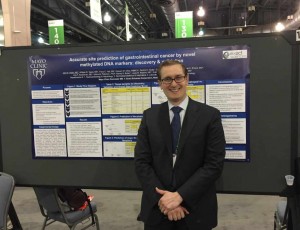-
 Cancer
CancerMayo Clinic Researchers Identify Methylated DNA Markers That May One Day Lead To Noninvasive Whole Body Cancer Screening
PHILADELPHIA — A team of Mayo Clinic researchers has succeeded in identifying the source of cancer in patients’ gastrointestinal tracts by analyzing DNA markers from tumors. The results open the possibility that doctors could one day be able to screen for cancer anywhere in the body with a noninvasive blood test or stool sample. Such tests, if they prove practical and feasible, could mean greater convenience for patients and saved lives through earlier diagnosis of cancer, especially rare and often lethal diseases such as pancreatic cancer or lung cancer.
The researchers' findings will be presented on April 21 in a poster presentation at the AACR Annual Meeting 2015 in Philadelphia by John Kisiel, M.D., a gastroenterologist at Mayo Clinic.
MEDIA CONTACT: Joe Dangor, Mayo Clinic Public Affairs, 507-284-5005, newsbureau@mayo.edu
Journalists: Sound bites with Dr. Kisiel are available in the downloads.
https://youtu.be/DbDHEpZWteQ
“What’s exciting about our discovery is that it allows us to stop thinking about screening organs and start thinking about screening people,” says Dr. Kisiel. “As far as we are aware, this is the first series of experiments that has ever shown this concept.” He and his colleagues studied cancer-free patients as well as patients with cancers of the colon or pancreas. By collecting and identifying methylated DNA in a blood test, they were able to identify the presence and origin of the cancerous cells with about 80 percent accuracy. “We think, based on the data we have, that a blood test could work in the future,” Dr. Kisiel says.
Researchers double-checked their results by examining methylated DNA in tissue samples, identifying the origin of tumors with greater than 90 percent accuracy. “Our work in tissue shows that we have fairly high precision,” says Dr. Kisiel, “but you can’t do a screening test in tissue, because you can’t biopsy all these tissues at once as part of a screening test. That would not be practical.”
The organ-by-organ search for cancer is precisely what Dr. Kisiel and colleagues hope to make unnecessary. While biopsies of organs have saved lives from common malignancies such as breast or prostate cancer, “we can’t screen for the less common cancers because the risk of false-positive diagnoses is too high,” says Dr. Kisiel. Doctors would unnecessarily worry patients and spend too much time and expense chasing cancers that may not exist. As a result, he says, “a cancer like pancreatic cancer, although it’s almost uniformly lethal, is not screened for at all in the general population, mainly because it’s rare.”

Finding and correctly identifying distinctive methylated DNA from the cancers in a blood or stool sample may change all that. “DNA methylation may be a way to fingerprint not only the tissues themselves, but also the different types of cancer that might arise in those tissues,” Dr. Kisiel says.
“We hope that in the future patients might be able to submit a blood specimen and then we can analyze that blood specimen for the presence and absence of cancer markers. And if they are present we hope to be able to determine the anatomic location of the tumor, or the organ from which it originates,” he says.
Dr. Kisiel’s research applied specifically to the gastrointestinal tract. “We’ve not yet tested this concept in cancers throughout the entire body, but that is the next step,” he says.
Under the best of circumstances, comprehensive cancer screening by blood or stool sample won’t be ready any time soon. “Patients shouldn’t be waiting for this to come to their physician’s office,” says Dr. Kisiel. “They should be working with their doctors to get screening tests that are currently available.”
About Mayo Clinic Cancer Center
As a leading institution funded by the National Cancer Institute, Mayo Clinic Cancer Center conducts basic, clinical and population science research, translating discoveries into improved methods for prevention, diagnosis, prognosis and therapy. For information on cancer clinical trials, call 1-855-776-0015 (toll-free).
###
About Mayo Clinic
Mayo Clinic is a nonprofit organization committed to medical research and education, and providing expert, whole-person care to everyone who needs healing. For more information, visit http://mayocl.in/1ohJTMS, or https://newsnetwork.mayoclinic.org/.








